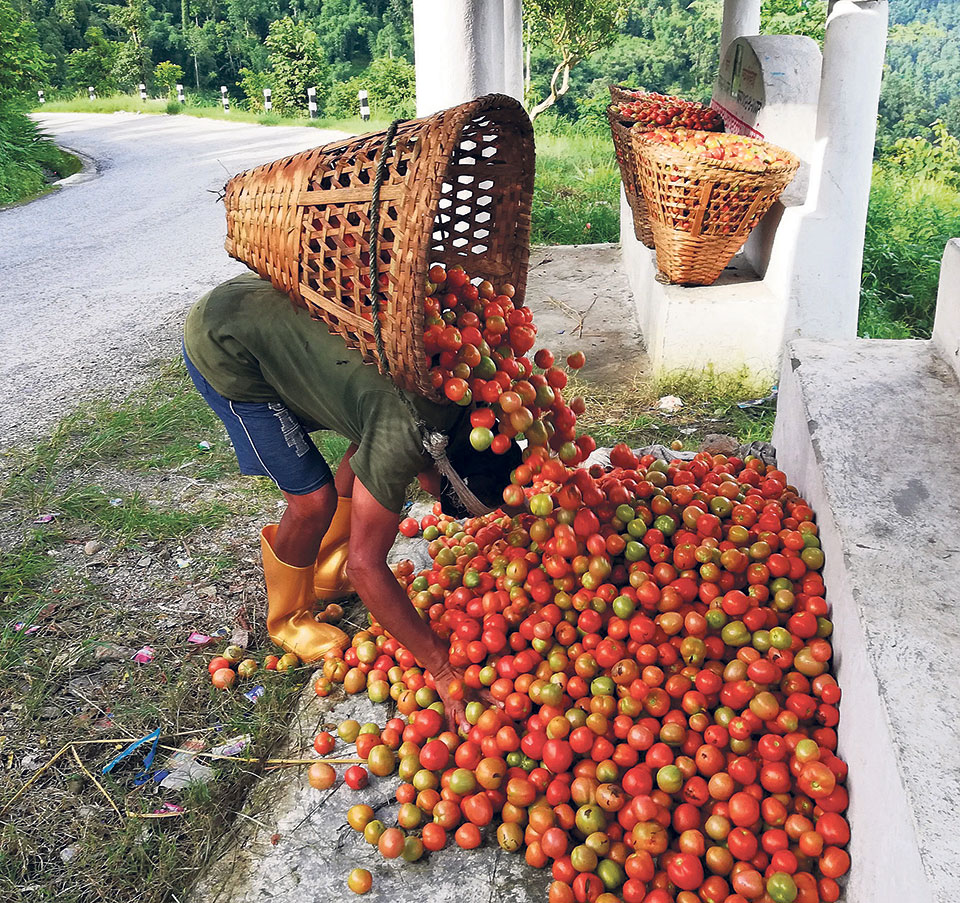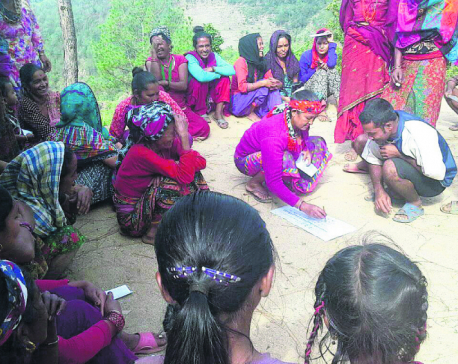
OR
Farmers worried as India halts tomato exports via Kakarbhitta
Published On: July 14, 2018 07:46 AM NPT By: Bhim Chapagain

ILAM, July 14: A bulk of Nepal's vegetable exports via Kakarbhitta border point in eastern Nepal used to be tomatoes until the past fiscal year. However, with India stopping import of Nepali tomatoes, hundreds of farmers from Ilam district fear that their production this year will simply go waste with no one to purchase them.
The Indian Customs Office, which time and time again finds one excuse or the other to hinder export of Nepali agriculture products to India, has obstructed export of tomatoes this time.
It has been a fortnight since Indian officials have stopped export of tomatoes from Nepal's eastern Panitanki border. With Indian tomatoes being popular among residents of Jhapa and Terai belt and with exports to India halted, tomato farmers and traders from the region have been at a receiving end.
According to traders from Jhapa, a single trader used to export up to 50 vehicles full of tomatoes until last year. Besides tomatoes, chayote (iskus) export from Nepal has also come to a standstill this year.
Trader Bijaya Chaudhari told Republica: “Now the tomato farms in the district have turned red with ripe tomatoes. But the Indian customs officers have refused to let Nepali tomatoes and chayote enter India at any cost.” He added.
“They simply return us stating that those vegetables are not in the list of vegetables to be allowed entry into their country,” he said. “They tell us to never try exporting those vegetables.”
Ambar Rai, a tomato farmer in Kolbung of Rong Rural Municipality -- 4, told Republica that he had purchased 2,000 saplings of tomato plants each for Rs 200 this year due to a good profit tomatoes had fetched him last year.
“I have invested double of what I did last year. Traders used to come to our farm to purchase tomatoes for up to Rs 40 per kg last year. However, traders have not come this year. This year, I have hardly been able to sell it for Rs 10 per kg,” he said.
Altogether, farmers in Ilam used to make between Rs 800,000 and Rs 1.2 million per year by selling tomatoes and chayote in previous years.
But the status quo this year has been a matter of great shock to farmers.
Another farmer, Gunja Singh Rai in Rong Rural Municipality -- 3 had also planted over 1,500 tomato saplings. However, he has had a hard time selling his yield. Disappointed, he said: “It seems unlikely that my tomato yield will fetch me any profit this year.”
Another farmer, Pankaj Dhakal stated: “I am not the only sufferer. There are many farmers having 1,000 to 1,500 tomato plants each. They are at the risk of losing hundreds of thousands.” He added that the government must sit with Indian officials to negotiate in order to resolve this issue.
Most farmers share common opinion that due to export dependency on India, Nepali farmers have had to risk their investments time and again.
Leela Devi Bhattarai, another farmer, urged the government to create a clear trade system with India.
“The country itself has many areas where food supply is inadequate. The government must create a mechanism through which farmers can supply their products within parts of Nepal where there is need. This way, at least the farmers’ investment will not go in vain,” She said.
“Although the country has no shortage of leaders who urge the youth to stay in Nepal and create self-employment opportunities, they have done nothing to create suitable environment for agriculture and animal husbandry.”
President of Ilam Chamber of Commerce and Industries, Ananda Kattel, stated that despite dozens of talks with the Consular General of India to ease the situation of trade between Nepal and India via Kakadbhitta, the problem has escalated even more.
According to him, farmers and traders will continue to suffer until there was a clear framework to govern trade and export between the two nations.
You May Like This
_20201229102632.jfif)
Punjab warns farm protesters against telecom mast attacks
NEW DELHI/MUMBAI, Dec 29: India’s major grain-growing state of Punjab on Monday asked police to crack down on farmers and... Read More...

Hindu nationalist group says India unlikely to accept China-led trade deal
NEW DELHI, August 2: India is unlikely to sign a China-backed Asia-Pacific trade pact because of opposition from industry and... Read More...

Farmers worried as paddy planting will collide with polls
KHOTANG, June 3: On February 20 when the Pushpa Kamal Dahal led government announced local elections after a hiatus of nearly... Read More...











Just In
- Challenges Confronting the New Coalition
- NRB introduces cautiously flexible measures to address ongoing slowdown in various economic sectors
- Forced Covid-19 cremations: is it too late for redemption?
- NRB to provide collateral-free loans to foreign employment seekers
- NEB to publish Grade 12 results next week
- Body handover begins; Relatives remain dissatisfied with insurance, compensation amount
- NC defers its plan to join Koshi govt
- NRB to review microfinance loan interest rate







Leave A Comment